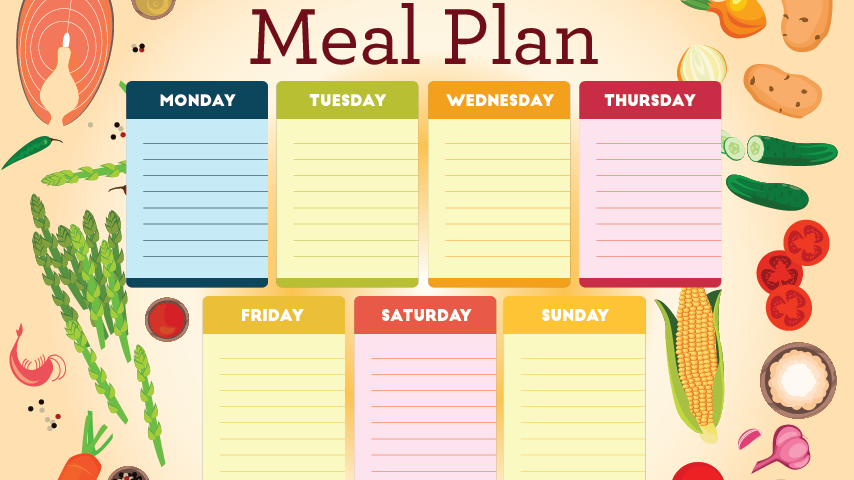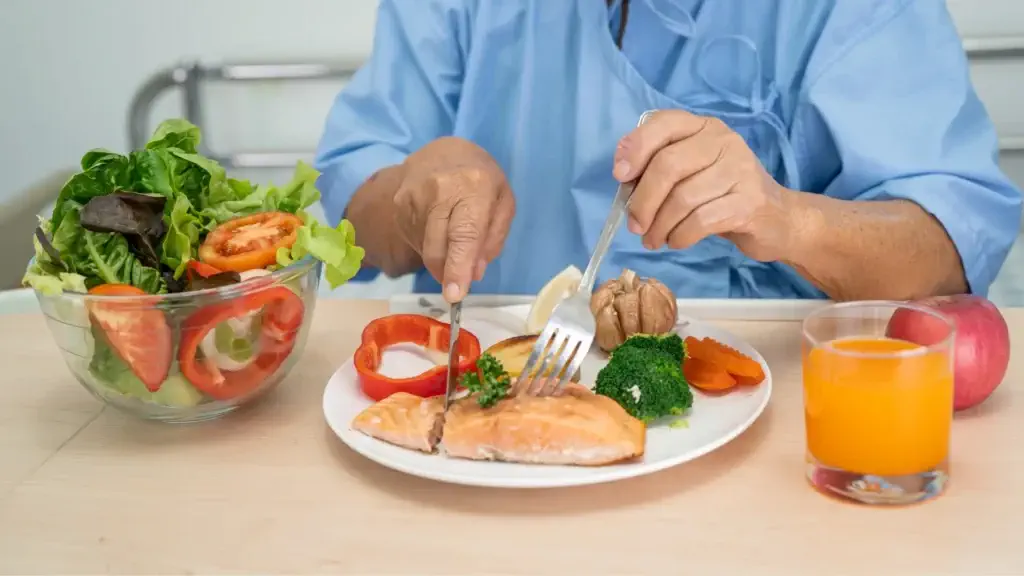
The Best & Nutritious Daily Meal Plan for the Elderly
Do you know what is the most suitable daily meal plan for the elderly? We have dedicated this article from humanhealthmag to this topic. As you know, people over 60 years of age are called elderly, and one of the important things that should be paid special attention to at this age is nutrition and the elderly diet plan. Because during this period, nutritional needs will change, and at the same time, the elderly person’s body is more susceptible to diseases due to exhaustion.
In the following, we will examine the features of the best diet plan for the elderly and also mention the essential nutritional recommendations for the elderly. Note that the food list for the elderly includes nutritious and easily digestible foods that guarantee the health and energy of the elderly.
How to Prepare a Diet for the Elderly
Preparing a daily meal plan for the elderly and their diet requires careful attention to the specific needs of this age group. Over time, physiological changes occur in the body that may affect appetite, digestion, and absorption of nutrients. As a result, this list should be adjusted to the food requirements for the elderly.
The elderly diet should also include a variety of foods, including fruits, vegetables, whole grains, lean proteins (such as chicken, fish, and beans), and low-fat or fat-free dairy products. Variety in the elderly’s diet helps provide the vitamins and minerals the body needs.
- Adequate protein: As you age, it is important to maintain strong and healthy muscles. Consuming protein sources such as eggs, fish, chicken, and legumes in your diet is essential for the elderly.
- High fiber intake: To prevent digestive problems, constipation, and improve digestion, seniors should get enough fiber from sources such as vegetables, fruits, and whole grains. Whole grain breads, brown rice, and oatmeal are good choices.
- Control salt and sugar: Reducing salt and sugar in the diet of seniors can help maintain healthy blood pressure and blood sugar levels. Instead of processed foods and sweets, choose natural, low-fat foods.
- Hydration: Adequate water and fluid intake is very important. Seniors may feel less thirsty, but they should drink water regularly to prevent dehydration.
- Vitamins and supplements: If necessary, the senior nurse can add vitamin D, calcium, and vitamin B12 supplements to the senior’s diet in consultation with a doctor to meet the special nutritional needs of seniors.

Simple Daily Meal Plan for the Elderly at Home
As we mentioned before, protein, which is considered one of the main needs of every person’s cells, is one of the most essential items that should be included in the daily meal plan for the elderly, but unfortunately, many elderly people do not consume enough protein and therefore have difficulty repairing, maintaining tissues and physical strength. Below we will mention a list of foods that elderly people can eat at different breakfast, lunch and dinner meals as desired.
Breakfast Meal Plan for the Elderly
Given that breakfast is the start of the day, it should contain an appropriate amount of protein to provide energy for the elderly. You should consider protein intake for the elderly per day when setting up this table for breakfast. The following can be suitable options for breakfast for the elderly:
| Recommended breakfast foods for seniors | Nutritional properties and benefits |
| Yogurt with nuts, almonds, and fruit | A source of protein, calcium, and essential vitamins |
| Skim milk with high-fiber cereal and fruit ju | Rich in fiber, protein, and vitamin C |
| Fresh or frozen cooked berries | Rich in antioxidants, vitamin C, and fiber |
| Oatmeal | Excellent source of fiber and sustained energy |
| Hard-boiled eggs with toast | Provides complete protein and energy |
| Peanut Butter Fortified Toast | Source of Plant-Based Protein and Healthy Fats |
| Wholemeal Bread with Avocado | Provides Fiber and Heart-Healthy Fatty Acids |
Lunch Meal Plan for the Elderly
It is better to use foods that are easy to digest and easily excreted from the body in the daily meal plan for the elderly. The following items can be included in the elderly’s lunch meal by the elderly themselves, their family, or their caregiver with these characteristics.
- Low-fat broth
- Almond puree or low-fat wheat halima
- Chicken sandwich (whole-grain bread)
- Baked potatoes with grated cheese and olive oil
- Vegetables and salmon, spinach and strawberry salad with olive oil
In addition to the above, do not forget to use green beans because these vegetables are rich in vitamin C.
Dinner Meal Plan for the Elderly
One thing you should keep in mind when preparing a daily meal plan for the elderly is that many elderly people either do not eat enough due to dental problems or swallow their food without chewing it well, so dinner, which is eaten before bed, needs to be lighter than lunch. The following are some of the foods that can be mentioned:
- Chicken salad
- Baked potatoes
- Vegetable pasta
In addition, using low-fat white fish, boiled, grilled or steamed, is recommended instead of red meat. Boiled eggs can also be included in the elderly’s diet two to three times a week. It should be noted that in addition to these foods, fresh lemon juice, basil powder and other dried vegetables can also be used. Note that the amount of food in each meal can vary based on the elderly’s condition, weight and other medical conditions.

List of the Best Daily Meal Plan for the Elderly
In preparing a daily meal plan for the elderly, snacks should also be considered. Snacks can play an important role in controlling appetite, providing the necessary energy, and preventing chronic diseases. Below, several examples of food lists for the elderly that can be beneficial for the elderly are introduced in more detail.
Nuts and seeds
- Nuts and seeds are rich sources of healthy fats, protein, fiber, and B vitamins. According to the benefits of nuts for the elderly, these nutrients are especially effective in reducing the risk of heart disease, controlling blood sugar, and improving brain function. Regular consumption of various types of nuts such as almonds, walnuts, pistachios, hazelnuts, peanuts, sunflower seeds, and pumpkin seeds can help the body’s overall health and prevent various problems.
Fruits
- Fruits are a great snack for seniors because they contain vitamins, minerals, fiber, and antioxidants. These nutrients can boost the immune system, improve digestion, and reduce the risk of chronic diseases. Recommended fruits include apples, bananas, strawberries, blueberries, avocados, oranges, and grapefruit.
Dairy
- Dairy products such as Greek yogurt, low-fat cheese, and milk are rich sources of calcium, protein, and vitamin D. These nutrients play a key role in strengthening bones and teeth, and can improve muscle function and make you feel fuller. By providing the calcium and protein the body needs, especially in the elderly, dairy products help maintain bone health and prevent osteoporosis and symptoms of calcium deficiency.
Legumes
- Legumes are another healthy and nutritious snack for seniors. They are rich in protein, fiber, vitamins, and minerals that can help lower cholesterol, control blood sugar, and improve heart health.
Eggs
- Eggs are a great snack for seniors, packed with high-quality protein, vitamin D, and choline. These nutrients help strengthen muscles, improve memory, and reduce inflammation. Slow.
Fish
- Fish, especially types rich in omega-3 fatty acids, such as salmon, trout, and sardines, are great sources of nutrition for seniors. These fatty acids help reduce the risk of heart disease, improve brain function, and reduce inflammation.
Whole grains
- Whole grains such as whole wheat bread, oatmeal, and brown rice are other healthy and nutritious snacks for seniors. These foods are rich in fiber, vitamins, and minerals, and help control blood sugar, improve digestion, and reduce the risk of heart disease.
Creative combinations
- Creative combinations can also provide a variety of delicious snacks for seniors. For example, fruit salad, which is a combination of different fruits with diverse and attractive flavors, or yogurt with fruit and nuts, which is a delicious and nutritious snack, can be good choices. Also, sandwiches made with whole grain bread and healthy ingredients such as cheese, grilled chicken, and vegetables, or hummus with whole grain toast, which is a vegetarian and energy-rich snack, can help to diversify and increase the appeal of snacks.

The Best Time to Eat for the Elderly
After preparing a daily meal plan for the elderly, it is time to set the right time to eat. Proper meal timing is very important for the elderly, as it can have several positive effects on digestion, blood sugar control, and constipation prevention. Main home remedies for senior constipation is that the elderly should increase their consumption of water, fiber, yogurt, and probiotics. When the elderly consume their elderly meals at specific times, their digestive system functions more effectively and digestive problems such as bloating, indigestion, and constipation occur less frequently.
This is especially vital for the elderly who are struggling with diseases such as diabetes, as regular meal planning helps control blood sugar levels and prevent sudden fluctuations. In addition, eating light meals early in the evening can have a significant impact on the quality of sleep for the elderly, preventing sleep problems.
To set a proper diet plan for the elderly, it is recommended to eat meals regularly and at specific times of the day. This not only helps to regulate the body’s internal clock, but also improves digestion. For example, starting the day with a complete breakfast that contains a combination of protein, carbohydrates and fiber provides the energy needed for daily activities and helps maintain stable energy levels throughout the day. In contrast, in the late hours of the day, consuming a light meal eaten a few hours before bedtime can help improve the quality of sleep in the elderly and prevent digestive problems during the night.
Concluding Remarks
In general, the best daily meal plan for the elderly should contain all food groups. Although the elderly need fewer calories than others, vitamins, calcium and proteins should be well included in this plan. The elderly should receive foods with high nutritional value and easy to digest in the diet. A nutritious breakfast for the elderly should be light, rich in vitamins and suitable for their digestive condition.
In conclusion, it can be said that the best diet and meal plan for the elderly is one that is in line with the specific needs of this period of life and helps maintain general health and prevent age-related problems, such as heart disease, diabetes and digestive problems. By following a balanced and regular diet, the elderly can experience a more energetic and healthier life and improve their quality of life.
We’re curious to hear your thoughts! What’s your take on this topic? Comment below and join the conversation; your opinion could spark new ideas!

FAQs
Why is it Important to Prepare a Meal plan for the Elderly?
Preparing a meal plan for the elderly helps meet their specific nutritional needs and prevents diseases related to nutrient deficiencies in old age.
What Are the Best Nutritious Breakfast Ingredients for the Elderly?
The elderly’s breakfast should include sufficient protein, fiber, and vitamins, such as yogurt with nuts and fruit, low-fat milk with high-fiber cereals, and boiled eggs with whole-grain bread.
What Foods are More Suitable for Lunch for the Elderly?
Low-fat, soft, and easily digestible foods such as almond paste, low-fat broth, or chicken sandwiches with whole-grain bread are recommended for lunch for the elderly.
How Much Fluid Should be Included in the Elderly’s Meal Plan?
The elderly should drink 6 to 8 glasses of water or healthy fluids daily to prevent dehydration and kidney or digestive problems.
